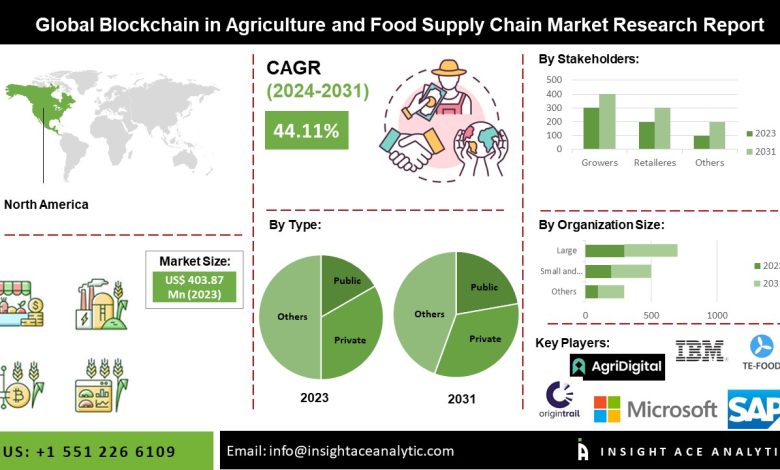Blockchain Applications in Agriculture

- Introduction to Blockchain Technology
- Challenges in the Agriculture Industry
- Benefits of Implementing Blockchain in Agriculture
- Case Studies of Successful Blockchain Applications in Agriculture
- Future Trends and Opportunities in Blockchain Technology for Agriculture
- Key Considerations for Implementing Blockchain Solutions in Agriculture
Introduction to Blockchain Technology
Blockchain technology is a revolutionary concept that has the potential to transform various industries, including agriculture. In simple terms, a blockchain is a decentralized, distributed ledger that records transactions across a network of computers. Each transaction is verified by multiple parties, making it secure and transparent. This technology has gained popularity due to its ability to provide a tamper-proof record of data, which can be particularly beneficial in the agricultural sector.
One of the key advantages of blockchain technology in agriculture is its ability to improve traceability. By recording every step of the supply chain on a blockchain, stakeholders can easily track the journey of a product from farm to table. This transparency helps to ensure food safety, quality control, and compliance with regulations. Additionally, blockchain can streamline processes such as payments, contracts, and certifications, reducing paperwork and increasing efficiency.
Another significant application of blockchain in agriculture is in the realm of smart contracts. These self-executing contracts are stored on a blockchain and automatically enforce the terms of an agreement when certain conditions are met. For example, farmers and buyers can use smart contracts to automate payments based on the delivery of goods or the quality of produce. This not only reduces the risk of fraud but also speeds up transactions and eliminates the need for intermediaries.
Overall, blockchain technology has the potential to revolutionize the agricultural industry by enhancing transparency, traceability, and efficiency. By leveraging the power of blockchain, farmers, suppliers, distributors, and consumers can all benefit from a more secure and streamlined supply chain. As this technology continues to evolve, its impact on agriculture is expected to grow, leading to a more sustainable and resilient food system.
Challenges in the Agriculture Industry
The agriculture industry faces several challenges that can be addressed through the implementation of blockchain technology. Some of the key challenges include:
- Lack of transparency in the supply chain, leading to issues such as food fraud and mislabeling.
- Inefficiencies in tracking and tracing products, which can result in delays and increased costs.
- Difficulty in verifying the authenticity and quality of agricultural products.
- Complexity in managing contracts and payments between different parties in the agricultural ecosystem.
By leveraging blockchain applications in agriculture, these challenges can be overcome. Blockchain technology can provide a secure and transparent way to track the journey of agricultural products from farm to table. It can also enable real-time monitoring of the supply chain, ensuring that products are handled properly and reach consumers in a timely manner.
Benefits of Implementing Blockchain in Agriculture
Implementing blockchain technology in agriculture can bring numerous benefits to the industry. By utilizing blockchain, farmers and other stakeholders in the agricultural supply chain can experience increased transparency, efficiency, and security in their operations. Here are some key advantages of incorporating blockchain in agriculture:
- **Enhanced traceability:** Blockchain allows for the tracking of products from farm to table, providing consumers with detailed information about the origin of their food. This transparency can help build trust and confidence in the food supply chain.
- **Improved food safety:** With blockchain, any issues related to food safety can be quickly identified and addressed, reducing the risk of foodborne illnesses and product recalls.
- **Streamlined transactions:** Blockchain technology can simplify and automate transactions between farmers, distributors, retailers, and consumers, reducing paperwork and administrative costs.
- **Smart contracts:** Smart contracts can be used to automate agreements and ensure that all parties involved in a transaction fulfill their obligations. This can help reduce disputes and improve overall efficiency.
- **Data security:** Blockchain’s decentralized nature makes it highly secure, protecting sensitive data such as crop yields, pricing information, and supply chain details from cyber threats.
Overall, the implementation of blockchain in agriculture has the potential to revolutionize the industry by promoting trust, efficiency, and sustainability throughout the supply chain. As more farmers and stakeholders adopt this technology, the agricultural sector is poised to benefit from increased productivity and profitability.
Case Studies of Successful Blockchain Applications in Agriculture
Several successful **blockchain applications** have been implemented in the **agriculture** sector, showcasing the potential of this technology to revolutionize the industry. Here are some **case studies** that highlight the benefits of using blockchain in **agricultural** processes:
- **Supply Chain Traceability**: One **successful** **blockchain application** in **agriculture** is the implementation of **supply chain** traceability solutions. By recording **transactions** on a **blockchain** ledger, **farmers** and **consumers** can track the journey of **agricultural** products from **farm** to table. This **increases** transparency and **trust** in the **food** **supply chain**.
- **Smart Contracts for Payments**: **Blockchain** technology enables the use of **smart contracts** in **agricultural** **transactions**, automating **payment** processes based on predefined conditions. This **reduces** the **risk** of **fraud** and ensures that **farmers** are **paid** fairly and promptly for their **produce**.
- **Data Management and Sharing**: **Blockchain** can facilitate secure **data** management and sharing among **agricultural** stakeholders, such as **farmers**, **retailers**, and **regulators**. By **encrypting** and **storing** **data** on a **decentralized** ledger, **confidentiality** and **integrity** of **information** are **maintained**.
- **Quality Assurance and Certification**: **Blockchain** can be used to **verify** the **quality** and **authenticity** of **agricultural** products through **digital** **certificates** and **audits**. This **helps** **consumers** make **informed** **purchasing** decisions and **builds** **trust** in the **market**.
These **case studies** demonstrate the diverse **applications** of **blockchain** technology in **agriculture**, offering **solutions** to **challenges** such as **traceability**, **payment** **security**, **data** **management**, and **quality** **assurance**. As **blockchain** continues to **evolve**, it is expected to **transform** the **agricultural** **industry** by **streamlining** **processes** and **enhancing** **efficiency**.
Future Trends and Opportunities in Blockchain Technology for Agriculture
As blockchain technology continues to evolve, there are numerous future trends and opportunities that hold great potential for the agriculture industry. These advancements have the potential to revolutionize the way agricultural processes are managed and tracked, leading to increased efficiency and transparency throughout the supply chain.
One of the key trends in blockchain technology for agriculture is the use of smart contracts. These self-executing contracts can automate various processes such as payments, agreements, and tracking of goods. By utilizing smart contracts, farmers and other stakeholders in the agricultural sector can streamline their operations and reduce the risk of fraud or errors.
Another emerging trend is the integration of Internet of Things (IoT) devices with blockchain technology. This combination allows for real-time monitoring of agricultural assets such as crops, livestock, and equipment. By leveraging IoT sensors and blockchain, farmers can gather valuable data on environmental conditions, crop health, and supply chain logistics.
Furthermore, blockchain technology offers opportunities for improved traceability and provenance in the agriculture industry. By recording every transaction and movement of goods on a decentralized ledger, stakeholders can easily track the origin of products, verify their authenticity, and ensure compliance with regulations and standards.
Overall, the future of blockchain technology in agriculture looks promising, with the potential to drive innovation, efficiency, and sustainability in the industry. By embracing these trends and opportunities, farmers and other stakeholders can unlock new possibilities for growth and development in the ever-evolving agricultural landscape.
Key Considerations for Implementing Blockchain Solutions in Agriculture
Implementing blockchain solutions in agriculture requires careful consideration of various key factors to ensure successful integration and adoption. Some of the key considerations to keep in mind include:
- **Data Security:** Ensuring the security of agricultural data is crucial when implementing blockchain solutions. Blockchain technology offers a decentralized and immutable ledger that can help protect sensitive information from unauthorized access or tampering.
- **Transparency:** Blockchain can provide transparency throughout the agricultural supply chain by enabling real-time tracking of products from farm to table. This transparency can help build trust among consumers and stakeholders.
- **Smart Contracts:** Utilizing smart contracts on the blockchain can automate various processes in agriculture, such as payments, agreements, and compliance. This can streamline operations and reduce the risk of human error.
- **Interoperability:** It is essential to ensure that blockchain solutions in agriculture are interoperable with existing systems and technologies. This will facilitate seamless integration and data sharing across different platforms.
- **Scalability:** As the agricultural industry continues to grow, scalability is a critical factor to consider when implementing blockchain solutions. Ensuring that the technology can handle an increasing volume of transactions is essential for long-term success.
- **Regulatory Compliance:** Adhering to regulatory requirements and standards is necessary when implementing blockchain solutions in agriculture. Ensuring compliance with data protection laws and industry regulations is crucial for maintaining trust and credibility.
By carefully considering these key factors, agricultural businesses can effectively implement blockchain solutions to enhance efficiency, transparency, and trust within the industry. Embracing blockchain technology can revolutionize the way data is managed and shared in agriculture, leading to a more sustainable and secure food supply chain.
